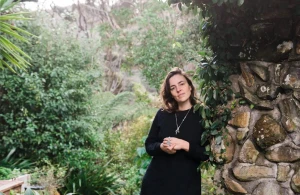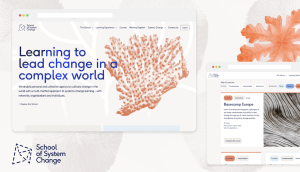Saskia is the Learning Curator at the School of System Change. Here she shares our evolution for the School, the path ahead and our intentions for inquiry and storytelling — jump to the end of this article to see our six key themes we’re exploring in 2023!
I have been at the School of System Change since March 2020. My first months blurred into the early days of the pandemic — a wild time to join any organisation as everyone sought to navigate uncertainty. At that time, the School of System Change was a programme run by Forum for the Future, and I joined as the programme’s Learning Curator.

Fast forward to early 2022. In some ways the turbulent times had calmed. Like many, we spent time and energy thinking deeply about what we value and how we want to contribute to the world. To do this, we realised we needed to step out on our own, to have more independence from, while continuing to work in partnership with, our founding organisation, Forum for the Future.
Our independence gave us the space to begin to breathe into a new way of being: one that enables us to flourish in pursuit of a world where people embrace complexity and address the challenges of our time through new ways of thinking, acting and being; one that supports our network structure; and one that nurtures more changemakers to enact deep, lasting change.
Our process for evolution
We see our organisation through a systemic lens — as a complex living being that is alive, interconnected, dynamic and ever-changing. This guided our process of evolution.

We leaned into our relationality, and the current iteration of the School of System Change is thanks in part to those who contributed and collaborated with us in the co-creative process of bringing it into being: our peers in the field of systems change learning; our trustees and the leadership team at our founding partner organisation; School facilitators; our alumni; wider advisory members; and our enabling team. They deeply inform who we are and how we want to exist in the world. It was through long conversations, structured interviews, surveys, collaborative sessions and feedback groups that our theory of transformation and new guiding principles were seeded and shaped.
Our evolution is also due to deep reflections that we undertook both individually and collectively as a team. We exercised inner work and collective reflecting to explore what it means to embody systemic worldviews and the aliveness, relationality and complexity of our world, in how we act, interact, design and communicate.
This informed everything, from our ways of organising to how we represent ourselves visually. Our design language is rooted in our interconnectedness with the world; we’re inspired by fractal patterns: mycelial networks, river deltas, tree branches, coastlines. Our brand represents multiplicity and growth and is designed to be easy for our team and wider network to use.

Our path ahead
We have a vision of a world that is just and regenerative, where we — people and society — have the ability to embrace complexity and work with it in our changing world.
We exist to nurture a systemic, living paradigm, where learning is change.
We believe that there is no one way to do systems change work, so we collaborate and co-design with expert facilitators and systems change practitioners through a multi-method approach to systems change learning.

The school will act as a network model, with a core enabling team and a wider network of contributors, facilitators and partners.
We are working with three key audiences: ‘irrigators’ (leaders within changemaker networks), ‘cultivators’ (people taking systems change into their organisations) and ‘seedlings’ (individuals who seek learning and development).
The transformation we seek is centred around irrigator partnerships and bringing systems change learning and knowledge to networks. Currently, we’re working with three core irrigator partnerships, in health, finance and across issues of climate.
Our learning and practice partnerships are core to our business and we’re continuing to develop systems change strategies and capacity within organisations.
Our open programmes, which we have been running since our inception in 2017, allow us to continue bringing systems change learning to the wider field. We have over 500 alumni and engaged over 100 contributors in the field, and we’re continuing to grow our offerings alongside our network.
Our seeds for storytelling
As we live into our new way of being, we ask ourselves, what kind of communication is needed to influence change in the world? How can we shift to a new paradigm of learning is change while honouring the multiplicity that exists within systemic practices?

In 2023, we are exploring the following themes in our communications.
Learning is change
#LearningIsChange
Moving into a new paradigm of a living, complex world, and examining how learning is the core essence of change.
Organising for change
#OrganisingForChange
Recognising that at the heart of all change is relationships and their power dynamics, and considering how we organise and govern for change.
Storytelling for change
#StorytellingForChange
Understanding the impact of systems change learning and the ripple effects in the system, and exploring what storytelling systems change calls for.
Change through irrigation
#ChangeThroughIrrigation
Creating processes of sustained learning infrastructures across geographies, ecosystems and thematic areas. Our irrigation strategy means partnering with networks to build systems change capabilities and leadership.
Equity and systems change
#EquityAndSystemsChange
Knowing there is no systems change without equity, we look into the shifting power dynamics & lift up diverse lineages from the global south, indigenous communities and different movements, philosophies and sciences; which we acknowledge have not equitably taken up space within systems change learning discourse.
Relational change
#RelationalChange
Exploring the relational learning approach to systems change learning. Systems are made up of people — how can we support the shift to more systemic ways of working?
Last thoughts
We know that change is needed; but meaningful, equitable change can be a long journey. I am grateful to be able to make space for the inner work, the collective reflection from within the School; and I am grateful to the wider whole of our peers, alumni, contributors and partners. The School is because we are — alive, learning and reflecting. I often return to the African idiom that Bayo Akomolafe brings to us all: “times are urgent, we must slow down”.
We invite you to inquire with us as we explore our themes for 2023. Check back here or subscribe to the School newsletter as we publish reflections, articles and resources.
See you out there!






